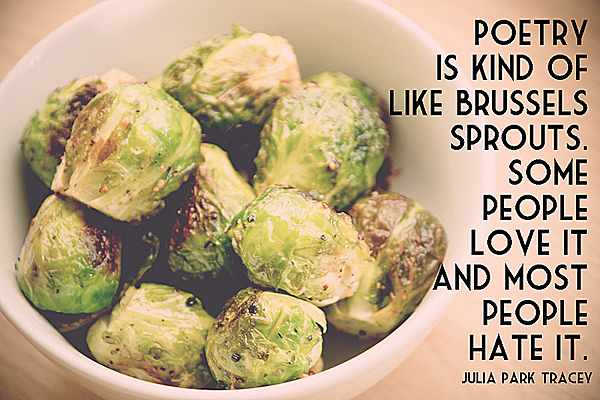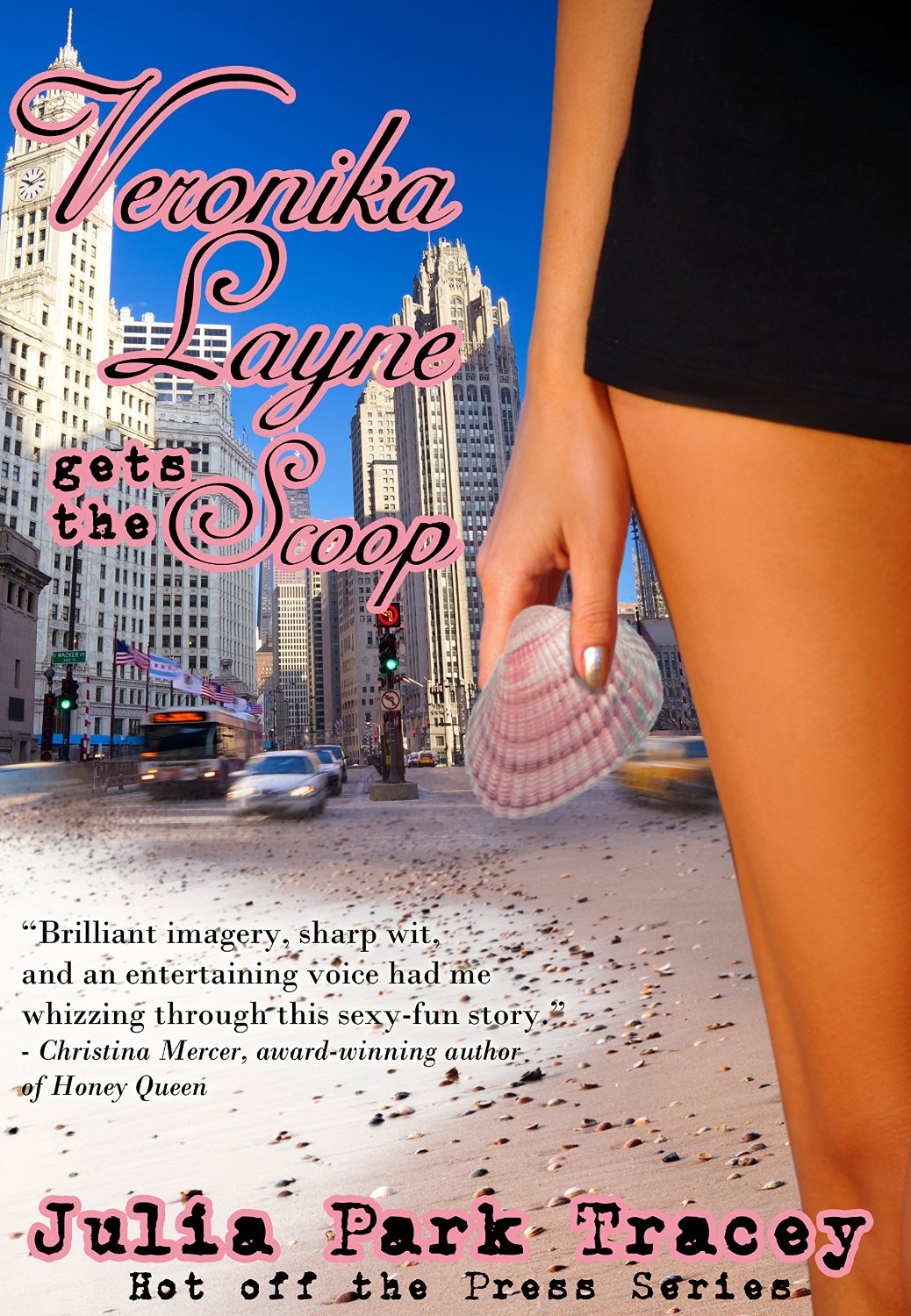
Poetry Corner — An Interview (from Sweatpants and Coffee)
“Poetry is kind of like Brussels sprouts,” a friend of mine said recently. “Some people love it and most people hate it.”
I find this both funny and, sadly, true; sadly because I consider myself a poet – but it took a long time, a lot of work and even more encouragement by fellow poets and mentors to claim that title.
The woman who made that tasty analogy is Julia Park Tracey, and she was recently named Poet Laureate for the city of Alameda, where she lives in California. In addition to being newly minted as Poet Laureate, Julia is also an accomplished editor and journalist, and has published books in a variety of genres, including novels, the collected diaries of her great aunt (a fabulous Flapper in the Roaring 20s) and, of course, poetry. It’s my distinct pleasure to sit down with Julia and, on behalf of Sweatpants and Coffee, learn more about what makes this pretty poet tick.
Tomi: Julia, how exciting to be named a Poet Laureate! Tell us the story of how you were appointed.
Julia: Alameda had a Poet Laureate named Mary Rudge for a long time – about 10 years. Mary passed away early in 2014 and the position was vacant. I was asked to apply by some folks at the city, and decided I would. I was surprised to be selected – I am known for many other things besides poetry, but poetry is my first literary love. So I’m pretty chuffed about the title.
Tomi: When and how did you start writing poetry?
Julia: My first exposure to real poetry came in 9th grade when I was home sick and my mom brought me some books from the library. On a whim, I asked her for poetry, and she brought me a large engraved picture book of Samuel Taylor Coleridge’s The Rime of the Ancient Mariner. I fell in love with the cadences. Another of the books had “Kubla Kahn” and I loved that, too. Very old-fashioned stuff, but soon I was reading Plath and Alice Walker and Marge Piercy and writing my own rhymey and not-rhymey verses. “Rhymey” is a technical term, right?
Tomi: Of course it is. Now, who would you say is your favorite poet, and what are a few of your go-to poems when you feel the need to be inspired, comforted or just need a few beautiful, brilliant words?
Julia: Favorites for many years have been Sappho, Rumi, Piercy and Walker – their words always resonate and make me feel larger, somehow. Sylvia Plath is interesting but she is impenetrable sometimes. She needs a hammer and chisel to break open. I am not a fan of McClure and the Beats in general, though there are some that I like. I was Harold Norse’s secretary for a summer in the early 90s. He was a good teacher. TS Eliot, Charles Simic, Sparrow – whoever is getting printed in The Sun – those poets are very good in general.
Tomi: You’ve written and published a lot more than poetry: you worked diligently through your great aunt Doris’s diaries and published them in two volumes. What inspired you to take on that project, and what did you learn from it?
How has the response been to the Diaries?
Julia: The Doris Diaries project has been an homage to my great aunt – she was an amazing writer but never published her best work. She wrote her life story and self-pubbed it at age 96 – but the magic had gone out of her words. The diaries are so vibrant – it was like discovering a trove of Virginia Woolf. Her way of telling stories, of accessing the human heart – lovely. I have been publishing these myself, but BookTrope is going to reissue the two I have done, and will support more volumes to come. All the profits I’ve received from publishing Doris’s words have gone to Reed College in Doris’s name, as scholarship monies.
People love Doris and her stories. I have a good following on Facebook and Twitter (look for The Doris Diaries) and I get comments and feedback every day from people who feel her pain or laugh at or with her. I’ve had nothing but good since I started publishing Doris’s diaries.
Tomi: I love that you’re donating the profits, and I think Doris would have dug it, too. I’m glad her life and stories are being shared and touching people, that’s awesome.
You also have one novel under your belt, and one to be published by BookTrope this fall (a very steamy novel, I will add). Give us a glimpse into those novels and what sparked you to write them.
Julia: My first novel was literary fiction and was my thesis from my MA program. It’s called Tongues of Angelsand is about a Catholic priest and the politics of falling in love when you’re vowed to celibacy. It was inspired by my former husband, who had been a priest before we married. It’s edgy and sensuous but not overtly sexy. It’s really about coming to a fork in the road and deciding what kind of life to lead – fulfilled or thwarted? Living truth or living a lie, and how your choices change your life.
The novel that BookTrope is publishing this fall is a fun, sassy chick-lit suspense novel about a tattooed and pierced reporter who stumbles across a big story and has to race the clock to save an Indian burial ground from real estate developers, and beat the competition, too. Plus she has lots of hot sex. It’s called Veronika Layne Gets the Scoop and is the first in a series of three (or maybe more). I have been a journalist for 30 years; you can count on the newspaper atmosphere to feel very authentic. You’ll have to guess about the sex, though.
Tomi: Oooh, having been a beat reporter myself, I look forward to that.
So, as if all this writing and publishing and poetry isn’t enough, you do a lot of good work in your community, including teaching workshops in journalism, creative writing and marketing for authors.
Julia: I like working with kids, so I teach journalism classes to kids after school. I have taught poetry or creative writing to all ages of classes – mostly through volunteering in my daughters’ classrooms over the years. I have three daughters plus two stepchildren, and so I’ve had kids in school for about 25 straight years. That’s a lot of volunteering. I have also done workshops at writing conferences about marketing and PR for writers – I ran my own boutique publicity firm for three years, specializing in PR for non-profits and artists, most of whom can’t afford a PR person – so I learned how to DIY, and that’s how I teach it.
It’s important to be a part of the community you live in, to make it better. I can’t throw buckets of money at projects like Bill Gates can, and my time is limited by family and work, but when I have a skill to share, and I see a need, I will offer it up. For example, I made my poetry book launch a food drive for our local food bank – to thank them for when I was a single mother and was a food bank client. I have made the “admission fee” to various events a new or used children’s book, and then shared those with local preschools. I have donated books or free consultations to the many silent auctions that our local charities have. Even if you don’t have money or time, there are things you can do. In September, I am reading aloud for an hour at a Banned Books read-a-thon. Anyone who can read can do that. It’s a pay-it-forward kind of thinking.
Tomi: That is a lot of do-gooding. Thank you for that, sister. Anything else you’d like to share before our Poetry Coffee Break is over?
Julia: The biggest help to me in the last few years has been to gather a strong community of other writers around me. Not to work alone – because writing is very lonely. You work in a vacuum and it’s hard to tell if you’re a genius or if you suck. Find other writers who can support you and give feedback, cross-market or go to events with you. I have had a handful of supportive women close at hand for the past three years especially, and they have made a world of difference to my writing, my sense of connectedness, and my outlook. Don’t go it alone – take a buddy!
Elegy for October 1989
After the earthquake, we half-laughed and half-cried
as we picked through our belongings
strewn in sliding piles on the tilted floor.
That night, we blinked for endless hours in the dark,
all of us in one bed, covers pulled to our chins.
Our eyes snapped open like Roman shades
when ceiling creaked or house settled.
The house seemed a trap, yet our only haven.
The earth bumped and shrugged some more,
tore me back under to the dark place, where I remembered the attack,
how I’d screamed and fought my panic, losing;
and I felt some embedded part of me hit open air,
torn from its protective sheath,
burning like a first breath, like pepper in the eye:
I am weak, there is something much stronger than I am.
I was weak then; they outgrew my control:
the faceless one,
the moving ground,
the shudders and hiccups that followed, for weeks, years,
that still send me, adrenaline-crazed, to doorjambs,
while my teacups and windows rattle.
Over Lake Merritt
I come down the steps of the bank building,
invisible in the evening rush,
a check in my hand for the money from the house
that is no longer mine, the life
that is no longer mine,
pinwheeling, careening toward whatever and who the fuck,
from some bliss and pain and secrets,
dead to their world, they dead to mine;
pelicans wheel above,
pterodactyls on the hunt,
their reptile legs tucked under,
their cold yellow eyes,
silent but screaming that aik aik that I hear
when I can’t open my eyes at night, when I am awake and yet asleep,
when I reach for what I had that is gone,
when I wake and am cold.
When I rise and am silent.
*originally published PEN West anthology, April 2007
You can follow Julia Park Tracey on Twitter and Facebook under her own name. Look for the Twitter hashtags #poetlaureate and #whypoetrymatters, and like the new Facebook page, Alameda Poet Laureate, for Julia’s latest poetry and literary happenings.
Photo credit: 
Facebook Conversations







